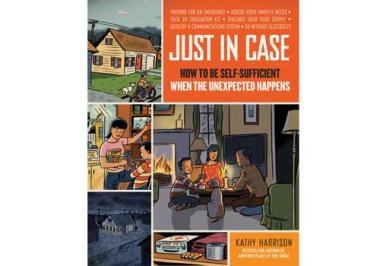What is better than having a row of bright red tomatoes lined up in your pantry for winter consumption? Nothing is better, but what is worse would be if all you had in your pantry for winter consumption was a row of bright red tomatoes.
There is no time like the present to be ready for what some believe is the inevitable: complete and utter apocalyptic meltdown of the American infrastructure. Electricity, Internet access, cellphones, cars, grocery stores and people are all sitting ducks. What we take for granted every day could be gone in a heartbeat or over a grueling period of gradual decline: first jobs, then gas, then health care. Whatever the cause of this meltdown, whether it be peak oil or financial implosion or a complete environmental disaster, you will still need to eat.
A woman from Cummington is ready for such a day. Kathy Harrison has written a book called Just in Case: How to Be Self-Sufficient When the Unexpected Happens. It outlines survival skills in an easy to read, not too terrifying guide. Some of the very useful information includes how a family can put up food for the winter months.
On Saturday, September 19 from 9 a.m. to 3 p.m., Kathy will be doing a canning demonstration in Cummington at the Community House, 33 Main Street. The author's take on preparedness is both practical and political.
ValleyLocavore: When did you write Just in Case?
Kathy Harrison: I wrote JIC in 2007.
Do you expect an apocalyptic event to occur in our lifetimes?
I do not expect an apocalyptic event, although one is not out of the question. Rather I expect a slow grinding down of the formal economy. This does not have to be a bad thing for everybody. In fact, there will be some positive results for many. We will all slow down and learn to enjoy small things more, such as good food—the growing, the preserving and the sharing with family and friends.
What can workshop participants expect when they attend your presentation in Cummington?
People can expect to learn the basics of food preservation, including the uses of a variety of food preservation tools. I hope each participant will leave with a sense of what's possible for them and then be motivated to try something new.
*
The folks over at NOFA (Northeast Organic Farming Association) are sponsoring this workshop and others on the same day throughout the state. Spokesperson Jassy Bratko said one of the benefits of buying from area farms during canning season is that prices are good.
"We want to make sure that people support local agriculture by buying their products, and use them all year around," Bratko said. "Also, if they have their own gardens and they have tons of something, preserving is a great way to save that food." Some farms selling by the box will offer wholesale prices. It is worth it when you consider that an $8 box of tomatoes can produce up to eight 32-ounce jars of tomatoes or tomato sauce.
On September 19, 10 other NOFA-sponsored preservation workshops will take place. One will be held at Town Farm in Northampton. All workshop participants will learn crop-specific techniques for "putting up" or preserving. Cost is $45 for NOFA members and $50 for nonmembers. For more information about NOFA's Preservation Workshop Series and for a list of area organic farms where you can purchase food for preserving, visit www.nofamass.org.
Recipe of the Week: Tomatoes "Sun Dried" While You Sleep
(Courtesy of Chef Donna Fisher)
Makes 10 servings
10 large plum tomatoes (about 3 pounds)
2 Tbsps. olive oil plus more for storing
1/4 tsp. salt
1/4 tsp. freshly ground pepper
1/8 tsp. sugar, honey, or balsamic vinegar (optional)
Preheat oven to 450 degrees. Line a large rimmed baking sheet with parchment paper.
Using a sharp paring knife, cut tomatoes in half.
Gently toss tomatoes in a large bowl with olive oil, salt, pepper and (optional) sugar.
Arrange tomatoes, cut side up, on baking sheet. Bake about 30 minutes at 450 degrees. Turn oven off after 30 minutes. Do not open the oven door. Just walk away and go to sleep for the night (8-10 hours). In the morning the tomatoes are dried and ready to be removed from the oven and eaten or stored.
These tomatoes can be eaten alone, but they also make a great topping for bread and sandwiches or a tasty accompaniment to cheeses like manchego and parmesan.
To store: Pack tomatoes in an airtight container, adding olive oil to cover. Store refrigerated up to 3 weeks. May also be frozen.
Events: Hunger Action Month, Food Bank of Western Massachusetts
Saturday, September 19
Global Mala 2009
A day-long event of yoga and spiritual action, with half of all proceeds benefiting the Food Bank
Where: Northampton Center for the Arts
When: Sun Salutation Mala 12-5 p.m. and Evening Program 7-9 p.m.
Tickets $27-$54 (available at The Hempest, Yoga Sanctuary, World Eye Books, Yoga Center Amherst, and Food for Thought Books). For more information, visit www.globalmalanorthampton.com or call 413-367-0377.
Thursday, September 24
1st Western Massachusetts Hunger Summit: Making the Connection
As part of National Hunger Action Month, this day-long conference will include workshops, panelists, and a keynote speech by Joel Berg, author of All You Can Eat: How Hungry Is America?
Where: Mass Mutual Center
When: Morning sessions for Food Bank partner agencies. The public and press are invited to hear lunchtime keynote speaker Berg, and stay for afternoon workshop sessions until 5 p.m.



